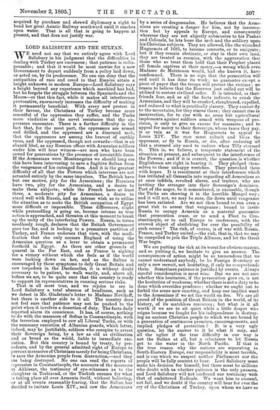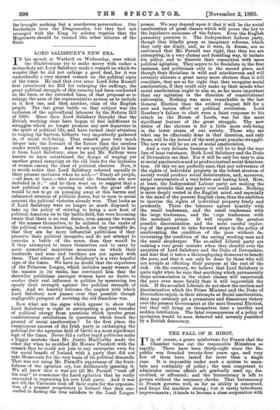LORD SALISBURY AND THE SULTAN.
WE need not say that we entirely agree with Lord Salisbury in his judgment that the difficulties in dealing with Turkey are enormous ; that patience is indis- pensable; and that it would be most unwise for a new Government to depart suddenly from a policy laid down, or acted on, by its predecessor. No one can deny that the antipathies of race and creed in that Empire attain a height unknown in modern Europe—Lord Salisbury says a height beyond any experience which mankind has had, but he forgets the struggle between the Spaniards and the Moors—or that this fact, while it makes all interference provocative, enormously increases the difficulty of making it permanently beneficial. With every new protest in their favour, the Christians of Turkey become more resentful of the oppression they suffer, and the Turks more vindictive at the novel resistance that the op- pressors encounter. There is a farther difficulty in the fact that, for the most part, the oppressors are armed and drilled, and the oppressed are a disarmed mob, that the oppressors are among the bravest of earthly races, and the oppressed, though not cowards—that is an absurd libel, as any Russian officer with Armenian soldiers under him will bear witness—are men who have been cowed for generations by the presence of irresistible force. If the Armenians were Montenegrins we should long ere this have been intervening to save a fugitive Sultan from the vengeance of his outraged foes. And it is the greatest difficulty of all that the Powers which intervene are not actuated entirely by the same impulses. The British have but one motive, pity for the Armenians ; the Russians have two, pity for the Armenians, and a desire to make them subjects; while the French have at least three, a moderate pity for Armenians, a desire to stand well with Russia, and an intense wish so to utilise the situation as to make the British occupation of Egypt more difficult or impossible. These differences, slight while protocolling is going on, become intense as true action is approached, and threaten at this moment to break up the unity of the interfering Powers. Russia, in terms needlessly rough, declares that the British Government goes too far, and is looking to a premature partition of Turkey, and France endorses that view, with the modi- fication that she only accuses England of using the Armenian question as a lever to obtain a permanent foothold. in Egypt. As there are other grounds of quarrel in the Far East, and as France is sighing for a victory without which she feels as if the world were looking down on her, and as the Sultan is encouraged by these symptoms to defy Great Britain and sow torpedoes in the Dardanelles, it is without doubt necessary to be patient, to walk warily, and, above all, before we act, to be quite sure that the country is ready to support its representatives in running serious risks. That is all most true, and we rejoice to see in Lord Salisbury a total absence of headiness, such as we detect in Mr. Gladstone's letter to Madame Novikoff, but there is another side to it all. The country does not feel sure that patience may not be pushed to the point when it involves a desertion of duty. The facts daily reported alarm its conscience. It has, of course, nothing to do with the massacre of Softas in Constantinople, with the terrorism employed to cow all Liberal Turks, or with the summary execution of Albanian guards, which latter, indeed, may be justifiable, soldiers who conspire to arrest their Sovereign being, by a law as old as civilisation and as broad as the world, liable to immediate exe- cution. But this country is bound by treaty, by pre- cedents, and by the general admitted right of Europe to prevent massacres of Christians merely for being Christians, to save the Armenian people from destruction,—and they are being destroyed. No one can read the reports of repression in Constantinople, the accounts of the massacre- at Akhissar, the testimony of eye-witnesses as to the .,laughter in Trebizond, or the Turkish excuses for what is taking place all over Armenia itself, without believing, or at all events reasonably fearing, that the Sultan has decided to imitate Louis XIV., and cow the Armenians by a series of dragonnades. He believes that the Arme- nians are creating a danger for him, not by insurrec- tion but by appeals to Europe, and consequently wherever they are not abjectly submissive to his Pashas and Colonels, he lets loose the mob and the soldiery upon his Christian subjects. They are allowed, like the wretched Huguenots of 1685, to become converts, or to emigrate ; but if they remain obstinate, or stay in their own land, they are treated as enemies, with the aggravation that those who so treat them hold that their Prophet placed all female captives at their mercy,—a wrong which even Madame de Maintenon would, had she known it, have condemned. There is no sign that the persecution will end until it has done its work ; no guarantee except a piece of paper that the troops will protect the victims ; no reason to believe that the Reserves just called out will be utilised to restore civilised order. It is intended, as their friends fear, and as all the facts indicate, to crush the Armenians, and they will be crushed, slaughtered, expelled, and reduced to what is practically slavery. They cannot fly to the mountains, for they starve there; they cannot rise in insurrection, for to rise with no arms but agricultural implements against soldiers armed with weapons of pre- cision, is only to give an excuse for massacre ; and to appeal for mercy to their Sovereign, whose taxes they pay, is as vain as it was for Huguenots to appeal to Louis XIV. The race must submit and bless the oppressor, or fly to Russia, or die, after enduring all that a stormed city used to endure when Tilly stormed it. This is, we believe, a temperate statement of the situation at present, and subsequent to the interference of the Powers ; and if it is correct, the question is whether Englishmen are right in bearing it. They pledged them- selves to these unhappy wretches. They provoked them with hopes. It is resentment at their interference which has irritated all Osmanlis into regarding all Armenians as at once infidels, revolted slaves, and traitors, who are inviting the stranger into their Sovereign's dominion. Part of the anger, be it remembered, is excusable, though the Turks are showing it in the horrible Mongol way ; and it will not, we may be sure, die down until vengeance has been satiated. Are we not then bound to run even a great risk to arrest that vengeance ; bound to invite Russia to occupy Armenia as a material guarantee that persecution cease, or to send a Fleet to Con- stantinople, or to call Europe to conference, with the avowed object of abolishing for ever the possibility of such scenes ? The risk, of course, is of war with Russia, France, and Turkey united,—the risk, that is, that we may be compelled to join the Triple Alliance, and let the Great War begin.
We are putting the risk at its worst for obvious reasons, and so putting it, we hesitate to give an answer. The consequences of action might be so tremendous that we cannot understand anybody, be he Foreign Secretary or only a new recruit, not hesitating, if only he comprehends them. Sometimes patience is justified by events. Always careful consideration is most wise. But we are not sure whether this hesitation, if the persecution goes on, is not the hesitation of weakness; whether there is not a duty to be done which overrides prudence; whether we ought not to forbid the scene now enacting, and keep our implied word to the Armenians if we set the world on fire. We are all proud of the position of Great Britain in the world, of its history, of its matchless resources ; but what is it all worth if we are to sit quiet while a little despot who reigns because we fought for his independence is destroy- ing an ancient Christian people to which we are bound by a generation of continuous promises, encouragements, and implied pledges of protection ? It is a very ugly question, let the answer to it be what it may, and all the uglier if the true difficulty in our way is not the Sultan at all, but a reluctance to let Russia get to the water in the North Pacific. If that is the true reason why the nations are separating in i South-Eastern Europe, our responsibility is most terrible, and is one which we suspect neither Parliament nor the people will be fully content to bear. Lord Salisbury must make his decision for himself, but there must be millions who doubt with us whether patience is the only panacea, and Lord Salisbury will not confound our testimony with that of embittered Radicals. We want him to succeed, not fail, and we doubt if the country will bear for ever the cry of the Christians of Tuikey, upon whom we have so far brought nothing but a murderous persecution. Our forefathers bore the Dragonnades, but they had not arranged with the King by solemn treaties that the Huguenots should be treated like other citizens of the State.



















































 Previous page
Previous page